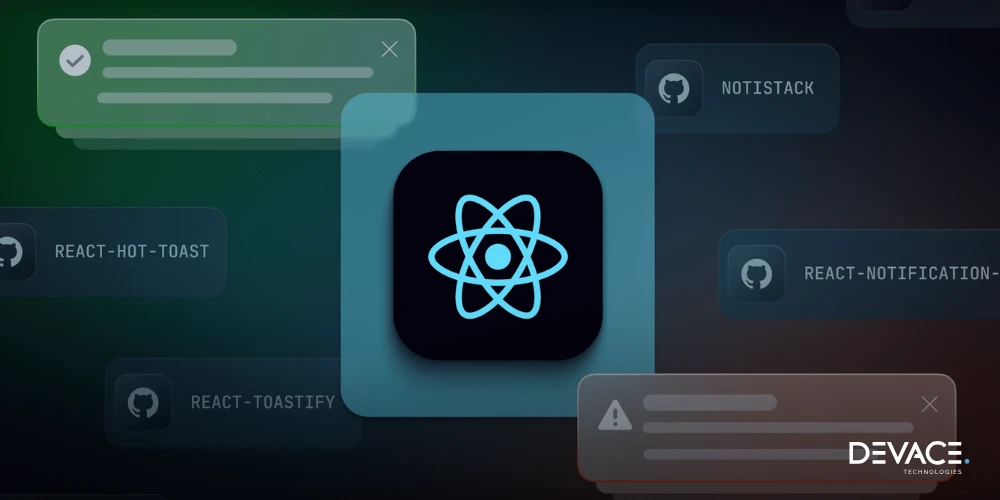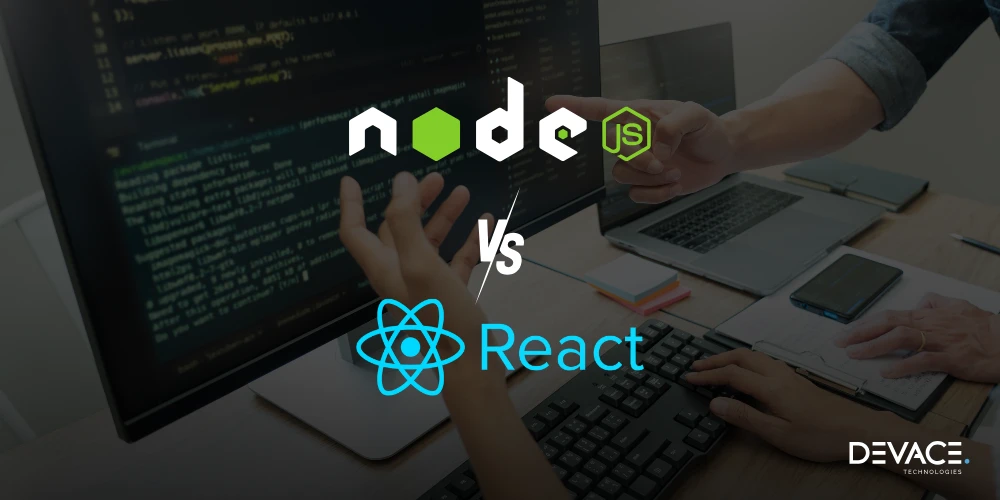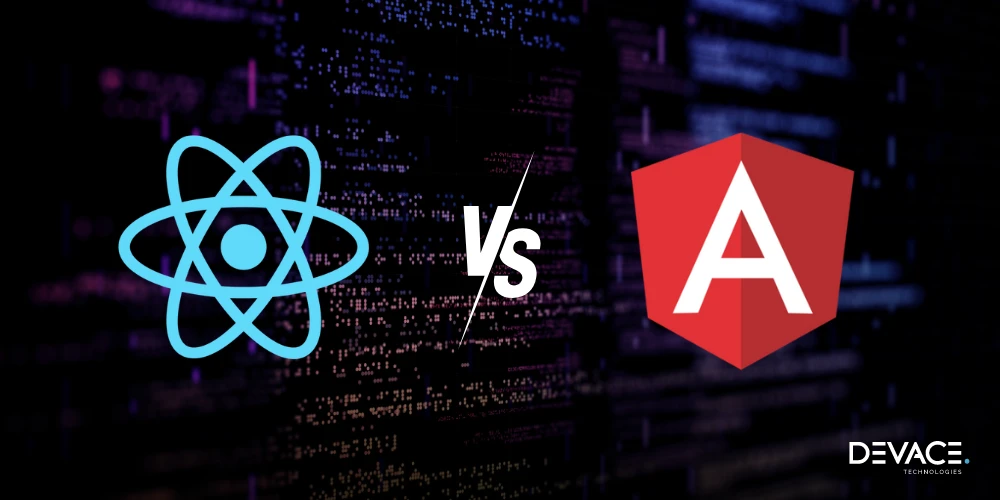Web developers are often looking for the right frontend framework that they should select for their web development projects. The most popular frameworks that stand out for front-end development are Vue and React. Developers prefer these frameworks to work on creating top-notch frontend web applications. But different projects have different requirements that question which one to use. Which one is the most suitable for your project? To figure this out read this detailed Vue vs React debate and make the right decision for your upcoming web development tasks.
Vue vs React: A Brief Introduction
Before getting into the detailed comparison of Vue vs React, let’s start with understanding their basics:
What is Vue?
This is a progressive JavaScript framework created to design user-friendly and interactive user interfaces (UIs). This platform is easy to integrate with other systems in various ways, including starting with a full-scale web application or a small component. This framework, Vue, was created by Evan You in 2014.
Moreover, Vue.js reactivity system is its best feature. This feature avoids direct manipulation, and UI updates are automatically triggered with any change in data. Also, this framework uses Vue Router for routing, Vue CLI for project scaffolding, and Vuex for state management. To benefit from these tools, it will be a good idea to hire Vue.js developers.
What is React.js?
Mostly called React, React.js is a JavaScript-based library, widely used for frontend web development. It was released in 2013 and created by Facebook (now Meta). In contrast with traditional web frameworks, React frameworks pay attention to the view layer of different web applications by using components to divide the user interface into manageable sections. Such reusable components help in promoting maintainability and efficient coding.
Moreover, one of the key features of React is virtual DOM. Through this approach by minimizing actual DOM interaction rendering performance is optimized. This library was specifically designed to build single-page applications but can be integrated with other tools and libraries. To have a smooth frontend development process with React you can hire React.js developers.
Are you facing difficulty during the front-end development of your web project?
Vue Vs React: Trends and Popularity
One of the important things to consider while choosing a web framework is its popularity. After popularity, there come the latest frontend trends. So, as you read about Vue.js vs React here, let’s note what’s the hype about them and what are the latest trends:
React: Popularity and Trends
Since its launch in 2013, it has become a widely used and popular framework among programmers. Its ecosystem has expanded with passing years and its backing by Facebook has made it a stable platform. This framework is the basis of large-scale applications handling high online traffic such as Netflix, Airbnb, WhatsApp, and Facebook. It is certainly a go-to option in 2025 for developers planning to work on complex and enterprise-level web applications.
Vue: Popularity and Trends
In contrast, Vue is relatively a new architecture as it was launched in 2014. Although it lacks corporate backing from huge platforms such as Facebook, it has developed its own dedicated and passionate community over time. Developers who want a clean, elegant, and simple framework for designing UIs can select Vue without having a single thought. Some of the high-profile companies using Vue in their production environment are GitLab, Xiaomi, and Alibaba. Also, this framework has gained popularity among the developer community in Europe and Asia.
Vue Vs React: Key Features and Similarity
Although we are having a React.js vs Vue.js debate, looking at some key similarities would be a good addition:

1. A Component-Based Architecture
Both frameworks have a component-based architecture. It means that your user interface is broken down into reusable and self-contained components. Through this structure, developers can maintain a clean code, it is well-organized and must be well-maintained.
Each component in both frontend frameworks is responsible for a particular UI section rendering. So, in a nutshell, this component-based architecture is a huge advantage for keeping things maintainable while programming. To leverage this, it would be a good idea to consider front-end developers for hire.
2. Virtual DOM
Both React and Vue frameworks utilize a virtual DOM. Virtual DOM is an abstraction of real-world DOM. It enables both web frameworks to figure out how changes in UI are managed. Here, only those parts of the UI re-render with data changes that require updates instead of the whole UI.
3. Application State Management
In the case of front-end complex applications, state management of the application is important. Both Vue and React give dynamic solutions for state management. For managing application state Vue uses Vuex and React utilizes Redux.
4. Support for Single Page Applications (SPAs)
For building single-page web applications both frameworks are suitable. Both these architectures take care of view updates and routing making them the best fit for designing advanced web applications.
Vue Vs React: A Detailed Comparison
Now we can have a look at all the key differences between Vue and React:
1. Learning Curve
One of the reasons behind Vue’s popularity is its gentle learning curve. Due to its simple and similar syntax to HTML it becomes an easy framework for beginners to start with. Also, the learning process is simple and smooth because of elaborative examples and documentation.
On the contrary, the learning curve of React is steeper. It is a bit difficult to start with especially when you are not proficient in JavaScript. It’s syntax extension which is a mixture of JavaScript and HTML makes it challenging to learn.
2. Scalability
In some areas, Vue.js is less opinionated than the other React frameworks. It provides flexibility however its tools and ecosystem are more integrated. For example, web development process becomes smooth with Vue CLI and Vuex which takes care of project setup and state management.
In contrast, allowing developers to design and manage their web applications the way they want, React is more unopinionated. This approach may overwhelm new developers but is an advantage for seasoned web developers.
3. Ecosystem and Tools
In comparison with React, Vue has a smaller ecosystem. It offers essential tools such as Vuex and Vue CLI however it does not have many third-party resources and libraries. React has a massive ecosystem and a vast range of libraries.
4. Functionality
Vue ensures excellent performance, especially for small and medium-sized applications. React also offers excellent performance, particularly for large-scale web applications. However, with React there are chances that performance may suffer if not optimized correctly.
For a detailed comparison have a look at the given table:
| Feature | Vue.js | React.js |
|---|---|---|
| Nature | JavaScript Framework | JavaScript Library |
| Release Year | 2014 | 2013 |
| Designed by | Evan You | |
| Key Focus | View layer & SPAs | View layer & SPAs |
| Learning Curve | Easy | Steep |
| Syntax | Uses JavaScript & HTML templates | Uses JSX |
| Architecture | MVVM | Virtual DOM |
| Management of State | Vuex | Redux |
| Functionality | Fast, suitable for small apps | Excellent, suitable for enterprise-level apps |
| Third-party integrations | Easy | Needs more setup |
| Community | Small | Huge |
| Ecosystem | Small | Large |
| Corporate Support | Independent | Supported by Facebook |
| Popularity | Getting popularity, especially in Europe & Asia | Most popular JavaScript framework |
| Reusable Components | Support reusable components | Excellent support for component reusability |
| Routing Documentation | Vue Router | React Router |
| Speed | Rapid | Requires customization |
| Mobile development | Vue Native | React Native |
| Debugging | VueDevTools | ReactDevTools |
| SEO | With SSR | With SSR |
| Testing Tools | Jest, Vue Test Utils | Jest, React Testing Library |
| Internationalization | vue-i18n | react-i18 next |
| Use Cases |
|
Development of performance-intensive, complex, and large apps |
| Job Market | Growing | Globally widespread |
| Libraries |
|
|
Vue Vs React: Which Frontend Framework You Should Select
Let’s see where each framework can be the best fit:
Select Vue if:

- You want to design small to medium-sized web applications.
- Require an easy-to-learn and simple framework.
- Need to prefer a smooth learning curve and a less opinionated design.
Select React if:

- Planning to build complex large-scale web applications.
- Require a framework with corporate support.
- Need to work with reusable components and your team is well-versed in JavaScript.
Are you seeking to leverage the true potential of front-end frameworks?
Wrapping Up
After this comprehensive Vue.js vs React debate, we can conclude that both of these frameworks are excellent to work with. The selection of framework depends on your project size, time frame, performance, and dynamic ecosystem of frameworks. In the case of small apps requiring simplicity and fast speed Vue can be the right option. In contrast, large-scale web applications can be better taken care of with React. Both frameworks offer interactive tools, and the choice is all yours.
Frequently Asked Questions
Is Vue.js better than the React framework?
Which platform is better for front-end development is largely dependent upon your project’s requirements and business goals. For beginners and to design small to medium-scale web applications and websites Vue is a more suitable option as it offers scalability and quick third-party integrations.
On the other hand, React is known for handling large-scale complex web projects, where scalability and performance are crucial. For advanced user interactions and applications, it is an ideal choice due to its component-based architecture and vast ecosystem of libraries.
Is Vue.js a backend or frontend framework?
Vue.js is a JavaScript-based frontend development framework created to build single-page web applications and interactive user interfaces. Developers can design dynamic web pages with Vue.js due to its key focus on the view layer. It also assists in building different components of UI.
Moreover, it handles the state efficiency of frontend components. This framework is not used for backend development however it interacts with the backend part with the help of APIs.
Is Vue.js a framework?
Yes, like other JavaScript frameworks, Vue.js is a progressive framework. It is a full-fledged framework offering tools for designing complex applications. Moreover, its integrated ecosystem is packed with tools for state management (Vuex), designing web applications (Vue CLI), and routing (Vue Router).
Although Vue is created to be scalable and can be gradually adopted in an already existing project it is a framework because it offers a clear structure to build flexible frontend applications.
Should I select Vue, React, or Angular framework?
If you should select Angular, React, or Vue it depends on certain factors including your project requirements, size and complexity, time frame, and experience of developers. In the case of large-scale web applications requiring a lot of flexibility and scalability, React can be an ideal choice because of its strong community support and vast ecosystem.
For enterprise-level applications, Angular is the best fit due to its dynamic built-in features. On the other hand, Vue is the most suitable front-end trend for small to medium-scale applications. Its gentle learning curve is a plus point.
Which is easier to use Vue or React?
In a React vs Vue debate, Vue is generally easier to learn due to its easy learning curve. Avoiding complexities, it’s a suitable choice of newbies who are just starting their career as a web developer. Moreover, it’s close to HTML and simple syntax makes it and easy option to learn. It’s easier to pick up due to a developer-friendly approach and clear documentation.
When to select Vue and React?
Here are the different cases when you can opt for React and Vue, React can be used in case of large-scale projects with high demands, where flexibility is required to structure your apps, and want to leverage a vast ecosystem. Contrastingly, you can choose Vue to build small to medium-sized web applications offering a fast and simple web development process.





